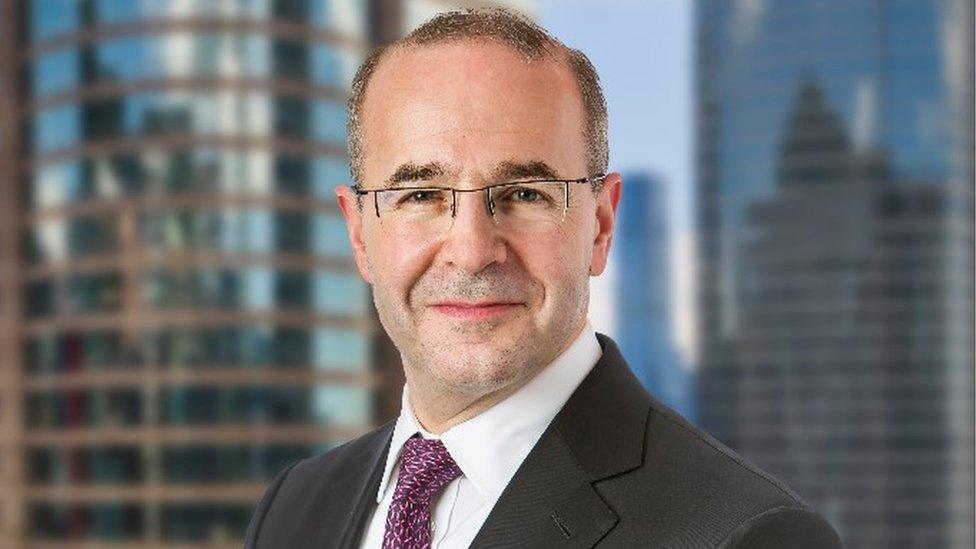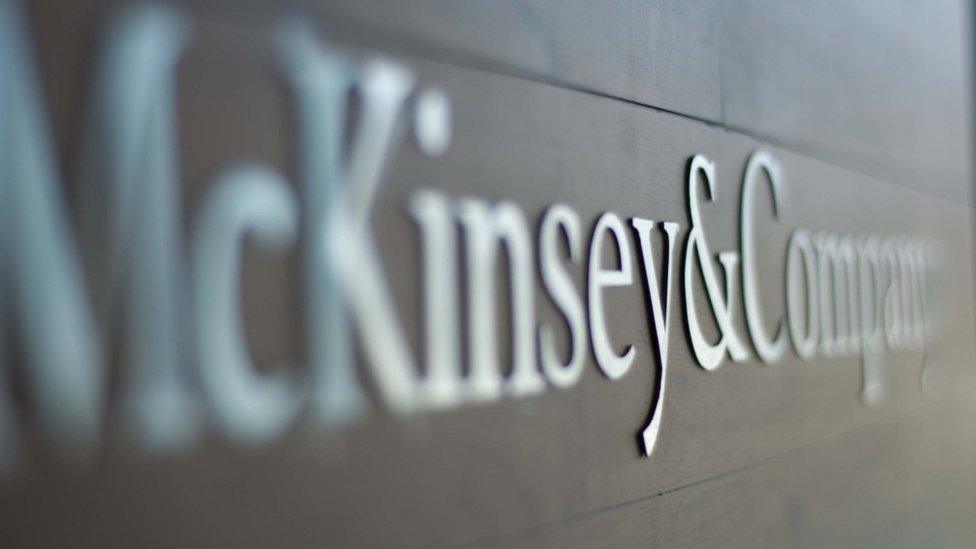Glasgow to global: Meet Kevin Sneader
- Published

Kevin Sneader is up at 05:30 each morning, working out and working out his strategy for the day's business meetings and activities.
His dedication, ambition and strategic focus have paid off.
He has just come through a secretive, three-stage voting process with an electorate of 560 - akin to that of the College of Cardinals - to become one of the most powerful and influential figures in the world of business.
The Canadian-born Scot is the new global managing partner of McKinsey, the bluest of blue chip management consultancies. He faces re-election by senior partners every three years.
Founded in 1926 in Chicago, only 12 men have led the organisation.
Its empire, now comprising more than 25,000 employees in 120 cities and expanding into the deployment of artificial intelligence and data analysis in ruthless pursuit of more efficient strategy, is hugely influential in the advice it gives big companies and governments.
That is not without its controversies. McKinsey is associated with NHS reforms in England. While its alumni have a strong track record of going on to lead the world's big corporations, that included Enron.

Recently based in Hong Kong as chairman of its Asia division, Sneader has been immersed in the potent and heady McKinsey culture since graduating in law from Glasgow University in 1989.
That year, he was president of the Glasgow University Union, a springboard for numerous others who made it in public life, though more often in politics.
He turned down a Kennedy Scholarship to Harvard, instead choosing to become McKinsey's first freshly graduated recruit from Scotland.
He would later return to Harvard to get one of the top awards when he graduated from its business school.
Part of that McKinsey culture is an annual cull of those who are not progressing up the company's career ladder. Now aged 51, married with two daughters, Sneader has survived the culls and thrived.
He worked in Paris and Washington, and moved to Beijing in the mid-1990s to open up its Chinese activities as that Asian market blossomed. His areas of expertise are in consumer goods, retail and healthcare.
In 2011, he became boss of the firm's UK and Ireland operations, before becoming head of Asia.
Celtic 'obsessive'
He is the son of Walter Sneader, a pharmaceutical chemist at Strathclyde University who was on a brief attachment in Canada when his son was born.
Kevin's mother, Myrna, was head teacher at the Calderwood Lodge Jewish nursery school.
Growing up in Glasgow, and privately schooled at Hutcheson's Grammar, Kevin developed an "obsessive" support for Celtic football club.
He told McKinsey's website: "Today, even though I've lived all over the world, my outlook remains rooted in Scotland and Scottish community values.
"I also developed a passion for Glasgow Celtic Football Club, travelling to away matches with Celtic fans and seeing the world through their eyes. Their lives were very much oriented around the football team.
"It gave me a sense of what it means to be part of a group that's passionately committed to something beyond work."

His hourly rate for consultancy is probably on the high side. But an insight into his insight is provided by a presentation he gave to the Business in the (Scottish) Parliament event 13 years ago.
As one of the international ambassadors for Scottish Enterprise, he was invited to that annual gathering of MSPs and Scottish business figures, and offered them the key lesson of "focus".
What on? Well, for government, it was to stimulate and nurture competition, as well as regulatory reform.
For the public sector more widely: articulate a vision of reform, "borrow with pride", while driving best practice and organisational change.
(I don't know how to borrow with pride, or for what. I'm going by the PowerPoint slides here.)
For the private sector, there was further advice:
Act as if your sector were twice as competitive
Be ruthless about exploiting information technology
Seek out best practice
It's not clear that many, at least in the public sector, were listening or willing to heed that advice.
Relentless drive
At Holyrood, they may be even less willing to listen to advice on how to implement austerity cuts, included in an article Kevin Sneader co-wrote.
The tips:
Work out what really matters, and stop everything else. When Canada tried that, out went agriculture and transport subsidies
Shake up organisations: think hard about how much has to be done by central government, and if it does, can it be done by a small team? That can also include transfer roles out of government, to the private or third sectors - but only if it delivers benefits in terms of cost savings and the quality of service
"Relentlessly drive out cost". Seek scale (do things on a larger platform) where it can deliver benefits, and where it can't, simplify and streamline.
Be sure to change the culture of the organisation, with a next generation of leaders to keep up the pace.
Politically, this very difficult, as Team McKinsey acknowledge. But as it's taken Kevin Sneader to the heights of the business stratosphere, maybe it's worth another look.